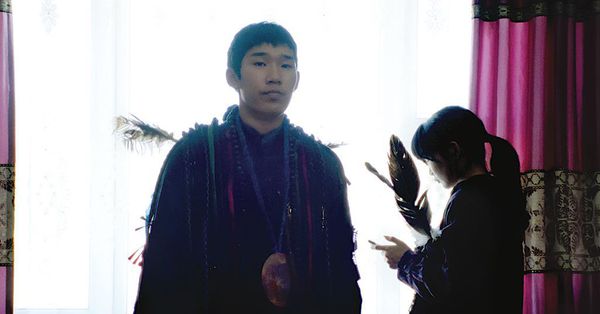Eye For Film >> Movies >> City Of Wind (2023) Film Review
City Of Wind
Reviewed by: Amber Wilkinson

Cinemagoers who have caught films about Mongolia previously are likely to have come to the country via the wide open spaces of the countryside captured in the likes of Tuya’s Wedding or The Eagle Huntress. This impressive debut from Lkhagvadulam Purev-Ochir, in contrast, takes us to the capital Ulaanbaatar. There, modern skyscrapers rub shoulders with brutalist architecture from the Soviet era and, in the ger district on the outskirts of the city, low-rise homes and yurts. This sense of contrast between the old, the new, the modern and the traditional is a current running beneath her tale that focuses on a young Shaman on the brink of adulthood.
Ze (Tergel Bold-Erdene) is 17 and in his last year of senior school, his stern teacher already expecting him to become a high-flying executive. The teenager already has another important job, however, that of being a shaman for his local community. We meet him in the intimate space of a yurt, wearing his garb and mask, where he channels ancestral spirits to offer a mixture of advice and support to those who seek it. In this close-quarters setting of reverence, to see the fresh-faced kid who lies beneath the ceremonial trappings comes as a surprise although those who seek advice from him treat him with respect. Or, almost all of them.
The exception is Maralaa (Nomin-Erdene Ariunbyamba). She’s about to have heart surgery, so her mum has called in the shaman for a spot of spiritual help. Maralaa, however, is having none of it, branding him “a fucking con artist” following the ritual. Opposites, as they say attract, and Ze is soon rocking up to the hospital as the pair spark up a relationship. Despite its spiritual element - a mysticism that is cleverly and increasingly nodded to through the course of the film - Purev-Ochir keeps her film firmly grounded. Although shamanism slots into the community like anything else, it doesn’t mean Ze doesn’t get ribbed about it in school - “What happens to your spirit when you come?” asks one classmate.
Ze’s uncertainty translates into a light rebellion - he dyes his hair and goes clubbing with Maralaa, although paradoxically, it is she who dreams of living in the wild open spaces close to nature while Ze has aspirations for a smart apartment in the city. Purev-Ochir avoids the usual cliches that might arise so that the nightclub space - so often represented as a transcendent space for teenagers on film - becomes an unsettling place where Ze obviously feels out of place.
Purev-Ochir gives a sense of the pressures the younger generation are under through their experience in the classroom, with a tacit implication that Ze’s struggles are reflecting a spirit of a nation that is also coming of age on its own terms since the revolution of 1990. There’s also a naivety to Bold-Erdene’s performance even when Ze is at his most rebellious that lends the film a sweetly hopeful note. Set largely against a backdrop of autumn and winter, the cool-toned backdrops serve to let the warmth of the relationships Purev-Ochir develops throughout glow even more strongly in contrast.
Reviewed on: 06 Sep 2023














